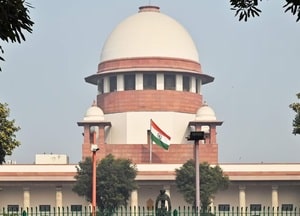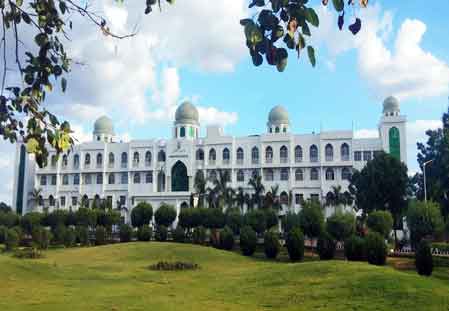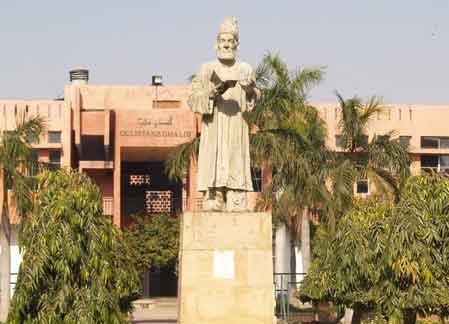The Supreme Court on Thursday flagged the ongoing influx of migrants through various border states of India and called for more robust policy measures to curb illicit movements and enhance border regulation.
A Constitution Bench, headed by CJI D.Y. Chandrachud, was dealing with a clutch of petitions challenging Section 6A of the Citizenship Act 1955, which confers citizenship on a specific class of migrants from Bangladesh to Assam, on the ground that it violates Articles 6,7,14, 29 and 355 of the Constitution.
Section 6A, introduced in 1985 by the Citizenship (Amendment) Act 1985, grants citizenship to persons of Indian origin who migrated to Assam from Bangladesh.
In a 4:1 decision, the Supreme Court turned down the challenge to the constitutional validity of Section 6A of the Citizenship Act 1955 but said it was imperative to acknowledge and address the valid concerns regarding the persistent immigration in Assam post-1971.
"Although Section 6A conferred citizenship rights exclusively to immigrants arriving before this cut-off date, there seems to still be an ongoing influx of migrants through various border states of India. Due to porous borders and incomplete fencing, this unceasing migration imposes a significant challenge," the SC said.
It referred to the statement made on behalf of the Union government that it was not possible to collect accurate data regarding illegal immigrants as such people entered the country in a clandestine and surreptitious manner.
In the course of the hearing, the top court had called for a common affidavit from the Union and Assam governments about the number of Bangladeshi immigrants granted citizenship under section 6A in Assam between January 1, 1966, and March 25, 1971.
Issuing a slew of directions to restrict illegal immigration post-1971, the Supreme Court said that while the statutory scheme of Section 6A is constitutionally valid, there is inadequate enforcement of the same, leading to the possibility of widespread injustice.
In substance, it held that immigrants who entered Assam prior to 1966 are deemed citizens, immigrants who entered between the cut-off dates of January 1, 1966, and March 25, 1971, can seek citizenship subject to the eligibility conditions prescribed in Section 6A, and immigrants who entered Assam on or after March 25, 1971, are not entitled to the protection conferred under Section 6A and declared to be "illegal immigrants".
Section 6A has become redundant with respect to those immigrants who entered Assam on or after March 25, 1971, the top court held, ordering the deportation of the illegal immigrants.
The SC said that provisions of the Immigrants (Expulsion from Assam) Act, 1950 should be read into Section 6A for the purpose of identification of illegal immigrants.
Noting that the statutory machinery and tribunals tasked with the identification and detection of illegal immigrants or foreigners in Assam are inadequate, the Constitution Bench said that constant monitoring by the top court is necessitated because "implementation of immigration and citizenship legislations cannot be left to the mere wish and discretion of the authorities".
The Constitution Bench directed that the matter be placed before the Chief Justice of India (CJI) for the constitution of a bench to monitor the implementation of its directions.
The amended Section 6A provided that "all persons of Indian origin who came before the 1st day of January 1966 to Assam from the specified territory (including such of those whose names were included in the electoral rolls used for the General Election to the House of the People held in 1967) and who have been ordinarily resident in Assam since the dates of their entry into Assam shall be deemed to be citizens of India as from the 1st day of January 1966".






Man held with stealing gold worth Rs 1 lakh while selling in jewelry shop
Alertness by a local jeweller and swift police action led to the arrest of a 24‑year‑old man who tried to sell stolen ornaments at SB Jewellers opposite Kali Bari in Bishramganj Madhya Bazar on Thursday afternoon.
Man found hanging in abandoned office
A sense of deep sorrow has gripped the Madhuban Jharjharia area under Amtali after the lifeless body of a young man was recovered from an abandoned building near the local electricity office on Thursday afternoon.
State making steady progress across all sectors: CM
Chief Minister Prof. Dr. Manik Saha today said that solving the basic problems of the people is one of the goals of the present government and Tripura is moving forward in all areas including health, education and sports.
State Cabinet passes resolution congratulating PM Modi, armed forces for success of 'Operation Sindoor'
The Tripura State Cabinet, led by Chief Minister Dr. Manik Saha, extended its heartfelt congratulations to Prime Minister Narendra Modi and the Indian Armed Forces for the successful execution of the anti-militancy mission, Operation Sindoor.
Maulana Azad National Urdu University cancels MoU with Turkish institute
Maulana Azad National Urdu University (MANUU) has announced the cancellation of its academic Memorandum of Understanding (MoU) with Yunus Emre Institute of Turkey in the wake of Turkey's support to Pakistan in the recent Indo-Pak conflict following the terror attack at Pahalgam.
After JNU, Jamia suspends MoUs with institutions in Turkey over support to Pakistan
Several prominent Indian universities have suspended their academic Memorandums of Understanding (MoUs) with institutions in Turkey, citing national security concerns.
India revokes security clearance of Turkey’s Celebi Airport Services
The government on Thursday revoked the security clearance for Turkish ground-handling firm Celebi Airport Services at the Indian airports, as calls grew to ban Turkish businesses in the wake of their country supporting Pakistan which harbours terrorism.
Indus Treaty on hold until Pakistan 'credibly and irrevocably' abjures support for cross-border terrorism
External Affairs Minister (EAM) S. Jaishankar on Thursday made it clear that the Indus Waters Treaty (IWT) will remain suspended until Pakistan stops sheltering internationally designated terrorist entities and individuals who are also engaged in cross-border terrorism against India.